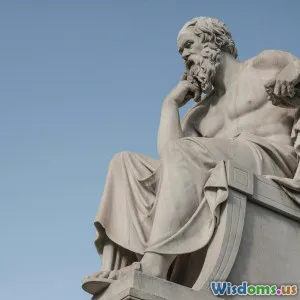
Timeless Wisdom from Ancient Legends
8 min read Explore timeless wisdom from ancient legends that inspire, teach, and guide us through life's complexities. (0 Reviews)
Timeless Wisdom from Ancient Legends
Throughout human history, ancient legends have served more than mere entertainment or religious observance. They preserve the collective wisdom, cultural values, and ethical foundations of civilizations. Though their origins often trace back millennia, the lessons embedded in these mythical narratives remain profoundly relevant in our contemporary world. This article dives into the timeless wisdom from ancient legends, exploring how these stories transcend time to inspire, teach, and guide us.
Introduction: Why Ancient Legends Still Matter
Imagine a story passed down through thousands of years, evolving through countless narrative tellers but retaining a core lesson crucial to human existence. Ancient legends, from the epics of Gilgamesh to the tales of the Greek gods, offer precisely this—a repository of knowledge about the human spirit, morality, nature, and the universe.
In an age dominated by rapid technological advancements and fleeting trends, the enduring nature of these legends reminds us that the fundamental dilemmas of humanity—love, honor, power, mortality—remain consistent. Their wisdom offers insights into human psychology, social order, and personal growth. Let’s explore some notable legends to uncover the lessons they impart.
The Body
The Epic of Gilgamesh: Embracing Mortality and Legacy
Dating back to around 2100 BCE, the Epic of Gilgamesh is one of the earliest known pieces of literature. This Mesopotamian epic centers on King Gilgamesh's quest for immortality after the death of his close friend Enkidu.
Key Lesson: The epic ultimately teaches acceptance of mortality and encourages focusing on the legacy one leaves behind.
Gilgamesh realizes that physical immortality is unattainable. Instead, true immortality lies in the deeds one performs and the wisdom shared with future generations. This lesson resonates in today's world, reminding us that our actions and contributions create lasting impacts beyond our lifetimes.
Greek Legends: The Pursuit of Balance and Hubris
Greek mythology is abundant with stories warning against hubris, or excessive pride. The myth of King Midas, who wished that everything he touched turned to gold, serves as a cautionary tale about greed and the consequences of desires unchecked by wisdom.
Insightful Quote: As the ancient tragedian Sophocles wrote, "Self-confidence is that which inspires confidence in others. Hubris is that which causes a man to forget his god..."
The narrative underscores the importance of balance—not just yearning for wealth or power but appreciating things that give life its true meaning, like love, friendship, and wisdom.
The Bhagavad Gita: Duty, Righteousness, and Self-Realization
Originating in the Indian subcontinent around 2,000–2,500 years ago, the Bhagavad Gita is a dialogue between warrior Arjuna and the god Krishna amid a great war.
It explores complex concepts of dharma (duty) and righteousness, emphasizing action without attachment to outcomes.
Practical Application: The Gita’s philosophy inspires mindfulness and ethical decision-making, even in high-pressure modern workplaces. Acting with integrity and focusing on effort rather than results can reduce stress and improve personal and professional fulfillment.
Native American Legends: Harmony with Nature
Many Native American stories emphasize the relationship between humans and nature. The legend of the Great Spirit teaching respect toward all living things promotes environmental stewardship.
In modern times, as climate change and ecological degradation intensify, this ancient wisdom informs sustainable practices and fosters a deeper ecological consciousness.
Example: The concept of the “Seventh Generation,” widely attributed to the Iroquois, encourages decisions that benefit seven generations into the future, highlighting long-term responsibility.
African Proverbs and Legends: Wisdom in Community and Resilience
African tales, like the Anansi the Spider stories from West Africa, often communicate wit, resourcefulness, and social cohesion.
Anansi is emblematic of the underdog who uses cleverness to overcome challenges.
This legend teaches flexibility and creative problem-solving—qualities vital in today’s fast-changing world. Furthermore, many African proverbs stress the power of unity; for instance, “If you want to go fast, go alone; if you want to go far, go together.” This reflects the timeless importance of collaboration and community.
Continued Relevance in Modern Life
Psychological Insights
These legends offer profound insights into human emotions and motivations. The journey of Gilgamesh grappling with grief mirrors universal experiences with loss and the search for meaning.
Modern psychology often echoes these age-old themes. For example, Carl Jung utilized myths to illustrate archetypes that reflect deep psychological realities shared across cultures.
Ethical Guidance
In an era of ethical quandaries involving technology, business, and the environment, ancient wisdom encourages responsibility, humility, and stewardship. The warnings against hubris in Greek myths parallel current debates about AI and power misuse.
Inspiration for Personal Growth
The Bhagavad Gita’s teachings about inner peace and selfless action inspire countless individuals seeking purpose amid complex life demands. Similarly, positing practical approaches to balance ambition with compassion, these stories foster resilience and self-awareness.
Conclusion: Bringing Ancient Wisdom Into the Present
The timeless wisdom distilled from ancient legends offers us nuanced understanding and moral guidance fitting for modern contexts. While cultural specifics vary, the core human concerns—our relationships, values, and existential reflections—cross borders and centuries.
Integrating these insights reignites curiosity about our past and enriches our present, urging us to act thoughtfully, embrace humility, and connect meaningfully with others and our environment.
In a world often fixated on the new, these ancient stories powerfully affirm the enduring human quest for wisdom, connection, and purpose. By listening to their echoes, we unlock a source of inspiration that never truly fades.
References:
- George, Andrew. The Epic of Gilgamesh. Penguin Classics, 2003.
- Radhakrishnan, S. The Bhagavad Gita. HarperCollins, 2006.
- Graves, Robert. The Greek Myths. Penguin Books, 2017.
- Deloria Jr., Vine. God is Red: A Native View of Religion. Fulcrum Publishing, 1994.
- Mbiti, John S. African Religions and Philosophy. Heinemann, 1969.
By embracing these ancient lessons, we nurture a timeless dialogue between past and present—an enduring framework that molds a more thoughtful and balanced future.
Rate the Post
User Reviews
Popular Posts




















